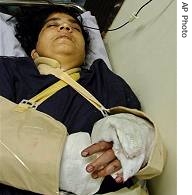-
(单词翻译:双击或拖选)
By Anjana Pasricha
New Delhi
29 October 2006
A law seeking to protect women from domestic violence has come into effect in India. Women activists1 are hailing it as a milestone2 in a country where complaints of abuse against women are rampant3.
-----
The new law promises to give women sweeping4 protection against all kinds of violence in the home, whether physical, sexual, emotional or economic.
 Shakuntala Verma's hands were chopped off for trying to stop child marriages at Bhangarh village in Madhya Pradesh state (File photo - May 11, 2005) |
||
One of the most common forms of violence is dowry related, where women are abused, beaten and even killed by their husbands and in-laws for not bringing enough gifts or money at the time of marriage.
Women activists say most victims suffer in silence. There is fear of social stigma7 in this very conservative society. And most women never approach the police because they are financially dependent on their abusers, and have nowhere to go.
The government says the new law will help bring about change by empowering women. It not only provides punishment for offenders8, but also gives victims of domestic abuse a share of the abuser's property and salary.
Rinki Bhattacharya, the author of the book "Behind Closed Doors," about domestic violence has been a victim of abuse in her own marriage, and she says the problem cuts across all strata9 of society - rich and poor, urban and rural. She hopes the new law will encourage more women to break through the wall of silence that surrounds the issue.
"I don't think I have adequate words to describe the trauma10 or the shame and the total feeling of powerlessness women experience if they have been subjected to this kind of violence," said Bhattacharya. "What I feel a little hopeful about is that if women know there is a law that can help them, they will not remain silent and suffer. It will at least give a woman a chance to address the issue."
Women activists have also hailed the law as a "powerful tool in the hands of millions of women" to fight abuse. But Ranjana Kumari of the New Delhi-based Center for Social Research says the legislation will only improve the situation if it is accompanied by efforts to change traditional thinking. Ms. Kumari says women's organizations are planning to launch mass awareness11 campaigns that target both men and women.
"It is important for men to know this law. They consider it their natural right to beat a woman, to scold a woman, to abuse a woman if the food is not cooked nicely or whatever, any small excuse and they think it is their right to abuse, hit, kick, emotionally torture, financially deprive the women," said Kumari. "Men must also understand that this is not right, they must not do this. "
The law has also broken new ground by bringing under its ambit not only married women, but also those in live-in relationships (those who are unmarried and living with a man).
 收听单词发音
收听单词发音
1
activists

|
|
| n.(政治活动的)积极分子,活动家( activist的名词复数 ) | |
参考例句: |
|
|
|
2
milestone

|
|
| n.里程碑;划时代的事件 | |
参考例句: |
|
|
|
3
rampant

|
|
| adj.(植物)蔓生的;狂暴的,无约束的 | |
参考例句: |
|
|
|
4
sweeping

|
|
| adj.范围广大的,一扫无遗的 | |
参考例句: |
|
|
|
5
coerced

|
|
| v.迫使做( coerce的过去式和过去分词 );强迫;(以武力、惩罚、威胁等手段)控制;支配 | |
参考例句: |
|
|
|
6
ministry

|
|
| n.(政府的)部;牧师 | |
参考例句: |
|
|
|
7
stigma

|
|
| n.耻辱,污名;(花的)柱头 | |
参考例句: |
|
|
|
8
offenders

|
|
| n.冒犯者( offender的名词复数 );犯规者;罪犯;妨害…的人(或事物) | |
参考例句: |
|
|
|
9
strata

|
|
| n.地层(复数);社会阶层 | |
参考例句: |
|
|
|
10
trauma

|
|
| n.外伤,精神创伤 | |
参考例句: |
|
|
|
11
awareness

|
|
| n.意识,觉悟,懂事,明智 | |
参考例句: |
|
|
|















